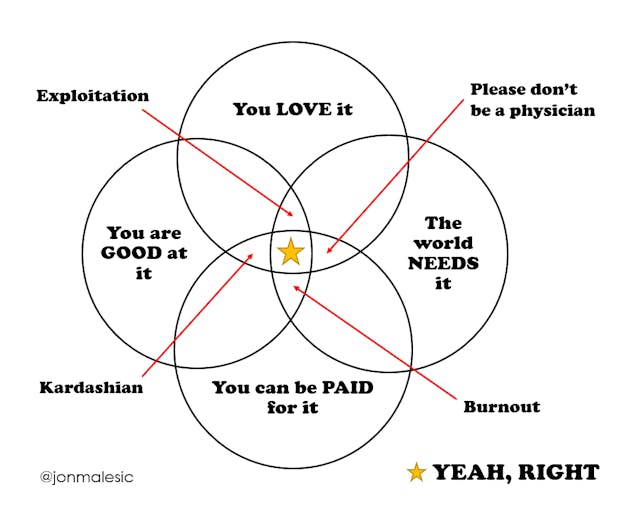A Venn diagram about “purpose” made the rounds on Twitter recently, and it was filled with words that could have been pulled from a random TED Talk:
Purpose: Passion, Mission, Profession, and Vocation Find your purpose and OWN it! #GrindDaily #MondayMotivation pic.twitter.com/Ouozafcezx
—
grinddailytweet
The diagram failed to label the arrowhead-shaped spaces near the center. In an act of public service, I filled them in:

I think these spaces were left blank because they indicated a forbidden conversation topic in the peppier quarters of the internet: the profound disappointment that actually characterizes most people’s search for purpose.
You may develop your talent, and the world may be crying out for it, but no one is willing to pay for it, and so you must either accept your exploitation or find something else to do. (This territory has been explored well by Jacobin contributing editor Miya Tokumitsu.) Or you no longer love something you once found purposeful. Or your talent is no longer needed, if it ever was.
Getting all four alleged elements of purpose to intersect is incredibly difficult. Even in the best of economic times, people rarely find remunerative work that they also love. And in an economy driven by consumer demand, what the world wants and what it needs may be quite different things.
So is all work meaningless, if it’s so hard to hit the “purpose” target?
No. For one thing, there can be plenty of value in performing work you don’t love. And I will grant that excellent, needed, and gratifying but unpaid work describes volunteerism as well as exploitation. But here, too, we see the lie behind the cheery “purpose” paradigm. If you volunteer for work you’re not actually good at, then you are not fulfilling a mission; you are taking mindless joy in doing unintended harm to others who need real help. Short-term voluntourism trips can be a burden on the very communities they are meant to serve.
We would be better off if we liberated work from the moral weight of “purpose.” There is dignity in the struggle just to get the objective (NEED, PAID) and subjective (GOOD, LOVE) elements of our work closer to each other. If we’re lucky, then we will be exploited for what we are good at, and we will meet someone else’s need through our own exhaustion. There is cause for celebration in that.
Few of us will ever find our meritocratic purpose, much less “OWN it!” That shouldn’t mean we’re failures. Often, just standing in the PAID circle is a triumph. That’s certainly true for day laborers, whose purpose on the job is to make each other’s work bearable. Their rule is, “Carry your end of the load.” If we all adopted that rule, then once we’ve carried our end, we can meet at the water cooler, share a laugh, and scheme to knock off early. Being human together is purpose enough.
